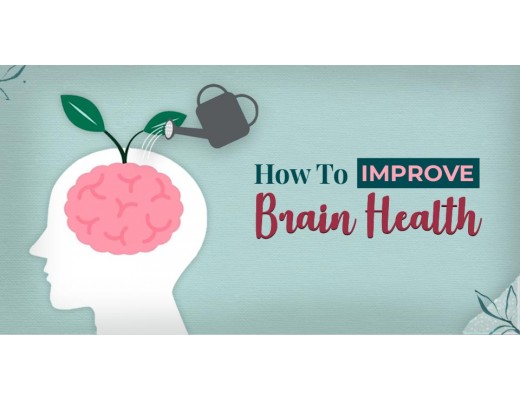As we age, our brain naturally changes, affecting memory, learning and 0ther mental functions. Mental decline might be normal but cognitive impairment is not inevitable. It is essential to keep your brain healthy to live a long and full life. Here are a few easy ways to keep your brain healthy and functioning well:
Get proper sleep
It is essential to get enough sleep for better cognitive function and mental health. Sleep deprivation is one of the biggest causes of reduced concentration, memory functioning and mood disorders such as anxiety and depression. It is believed that sleep helps clear abnormal proteins in the brain and consolidates memories, boosting overall memory and brain health. Instead of fragmented sleep, try to get consecutive hours of sleep per night when possible as it gives your brain the time to consolidate and store memories effectively.
Consume healthy food and supplements
Having a healthy and balanced diet plays a role in improving brain function and reducing the risk of cognitive decline. A good example of healthy diet is the Mediterranean style diet that emphasizes fruits, vegetables, fish, nuts, unsaturated oils and plant sources of proteins. Such diet has shown a positive impact on cognition and healthy brain function. Leafy green vegetables like spinach and kale contain nutrients that promote healthy blood flow to the brain. Some berries improve memory and overall brain function due to its antioxidant property. Foods that are rich with omega-3 fatty acids are essential to help prevent inflammation, maintain cell membranes and support cognitive function.
Exercise regularly
Other than the benefits for physical health, regular exercise can boost brain health in terms of memory, cognition and motor coordination. Exercise increases the blood flow to the brain, delivering essential nutrients and oxygen. According to studies, there is an association between physical activity and reduced risk of cognitive decline. Physically active people tend to have better cognitive function and memory compared to people living a sedentary lifestyle. For example, 20 to 30 minutes of moderate-paced aerobic activity like walking or cycling multiple times a week has been shown to have positive long-term cognitive impacts. In addition, exercise is involved in the growth and development of nerve cells, thus increasing the connections between brain cells.
Keep your blood pressure, cholesterol and blood sugar level under control
The 3 highs, namely high blood pressure, high LDL (“bad”) cholesterol level and high blood sugar level are the significant risk factors for cognitive decline and dementia. Lifestyle modifications can help to keep your blood pressure and cholesterol at an appropriate level. Diet, exercise, weight control, limiting alcohol and avoiding tobacco are essential to maintain a healthy lifestyle. However, if the levels are still higher than normal, you may need medication to achieve a good control.
Stay mentally active
Reading, puzzle-solving and brain training are also ways to boost brain power and improve brain health. These activities help stimulate the mind, keep the mind sharp, improve problem-solving skills, and reduce stress and anxiety. Often, actively engaging in cognitively stimulating activities has a positive impact on the brain functions, including memory, attention, thinking and reasoning skills. From the research, it is believed that mind games stimulate new connections between nerve cells and even help the brain generate new cells. It is not encouraged to watch television all day because it is a passive activity that does little to stimulate the brain. In fact, try to incorporate different activities to enhance cognitive abilities.
Build social networks
Stay socially engaged and pursue social activities that are meaningful to you. At times, family and friends provide emotional support that helps reduce stress levels. Consider joining community events that you are interested in. For example, volunteering at a local shelter if you love animals. Socializing keeps our brain active by exercising our cognitive skills, such as communication and problem-solving. It also helps to boost our mood and improve the overall sense of well-being. Therefore, having positive relationships and maintaining a strong social network have been associated with a lower risk of dementia and a longer life expectancy.
Care for your emotions
It is important to seek help if you are struggling with brain health or mental illness. People who are anxious or depressed are at an increased risk for cognitive decline. Seek talk therapy or medical treatment if you have symptoms of depression, anxiety, or other mental health concerns. Also, try to manage stress because it can affect mood, memory and promote anxiety. Intermittent and long-term stress has a negative impact on the brain, which has been linked to inflammation and chronic illness. Engaging in weekly stress reduction exercises is a way to take care of our mental health.
Supplements
Omega 3 Fish Oil

In fish oil, the most crucial and core components are the two fatty acids, which are well-known as docosahexaenoic acid (DHA) and eicosapentaenoic acid (EPA). Most people do not get sufficient amounts of DHA and EPA from their diets. Therefore, taking fish oil supplements, especially the ones that are molecularly distilled, will greatly benefit our health development, including good brain health maintenance and development.
In particular, DHA is considered to be the core component for building up brain cell membranes, which is essential for the growth and development of the brain in infants and fetuses, and maintenance of normal brain functions in adults. Both EPA and DHA do provide nerve-protecting effects in aging and neurodegenerative diseases, like Alzheimer disease and Parkinson disease. Lower level of DHA in blood has been found to be associated with the smaller brain size of older adults, which is a sign of brain aging being accelerated. On the other hand, EPA has been found to be able to improve the symptoms of depression and other mental disorders, like bipolar disorder.
Recommendation of taking at least 1000 mg of combined EPA and DHA, and not exceeding 3000mg. Higher composition of EPA is recommended for depressed people, and higher composition of DHA for adults with family history of neurodegenerative diseases.
Choline
Choline is a vital nutrient that can be obtained in some foods and also dietary supplements. In dietary supplements, it is often combined with vitamin B complex as they have similarities in ways of affecting body functions, such as liver function, development of the brain, and nervous systems.
Choline is the core component of production of acetylcholine in our body, which is a cell messenger for memory, muscle control, mood and other nervous system functions. Apart from that, it also acts as a building block for the production of two major phospholipids in our body, which is important for preserving cell structure integrity, and subsequently promotes the cognitive functions of our body.
The recommended intake of Choline is based on the age of an individual as stated in the table shown below:

Ginkgo Biloba Extract

Among the ancient living trees, ginkgo is one of them and has abundant therapeutic values that have been extensively used in China for about 5000 years.
There is a standardized extract of ginkgo biloba leaves, which is known as EGb 761. It provides protection against free radicals, which are unstable molecules that can cause damage to cells, leading to development of illness and aging. According to studies, it is proven to be effective in relieving and treating diseases like anxiety and depression. It also shows improvement on cognitive functions and behavior in mild-to-moderate dementia patients. Apart from these, it provides enhancement in brain function by improving memory, focus and also attention span.
The recommended daily intake of EGb 761 is 120 mg to 240 mg daily.
Curcumin

Curcumin is a substance that is found in turmeric, and a spice that is well known for its medicinal properties. It can provide multiple benefits, like protection against free radicals and anti-inflammatory properties, even in healthy people. Due to its significant anti-inflammatory properties, chronic diseases that tend to cause inflammation, such as Alzheimer disease, Parkinson’s disease, asthma, cancer, allergy and etc, ingestion of curcumin will ultimately bring huge benefits. In addition, curcumin is found to be able to improve mood, memories and attention abilities. Studies have also shown that curcumin has great potential in providing anti-anxiety effect in healthy obese people.
References
- Johnson, J. (2021) Brain exercises: 22 ways to improve memory, cognition, and creativity, Medical News Today. MediLexicon International. Available at: https://www.medicalnewstoday.com/articles/brain-exercises#visualizing-more (Accessed: October 29, 2022).
- SciTechDaily.com (2022) 9 ways to Improve Brain Health, SciTechDaily. Available at: https://scitechdaily.com/9-ways-to-improve-brain-health/ (Accessed: October 29, 2022).
- 10 ways to love your brain (no date) Alzheimer’s Disease and Dementia. Available at: https://www.alz.org/help-support/brain_health/10_ways_to_love_your_brain (Accessed: October 29, 2022).
- 8 easy ways to boost your brain health (2021) PeaceHealth. Available at: https://www.peacehealth.org/healthy-you/8-easy-ways-boost-your-brain-health (Accessed: October 29, 2022).
- 12 ways to keep your brain young (2022) Harvard Health. Available at: https://www.health.harvard.edu/mind-and-mood/12-ways-to-keep-your-brain-young (Accessed: October 29, 2022).
- Change your mind: Meditation benefits for the brain, Ask The Scientists. Available at: https://askthescientists.com/brain-meditation/#:~:text=Meditation%20is%20shown%20to%20thicken,lower%2Dorder%20brain%20activities%20decrease. (Accessed: October 29, 2022).
- How Omega-3 Fish Oil Affects Your Brain and Mental Health. (2017) healthline. Available at: https://www.healthline.com/nutrition/omega-3-fish-oil-for-brain-health#TOC_TITLE_HDR_7 (Accessed: October 29, 2022).
- Are Omega-3s Good for Your Brain. (2018) Time. Available at: https://time.com/5316521/omega-3-brain-health/ (Acessed: October 29, 2022).
- Long-chain omega-3 fatty acids and the brain: a review of the independent and shared effects of EPA, DPA and DHA. (2015) National Library of Medicine. Available at: https://www.ncbi.nlm.nih.gov/pmc/articles/PMC4404917/ (Accessed: October 29, 2022).
- Fish Oil Dosage: How Much Should You Take Per Day? (2018) healthline. Available at: https://www.healthline.com/nutrition/fish-oil-dosage (Accessed: October 29, 2022).
- Choline. (2022) National Institutes of Health. Available at: https://ods.od.nih.gov/factsheets/Choline-HealthProfessional/#:~:text=In%20addition%2C%20choline%20is%20needed,functions%20%5B1%2D3%5D. (Accessed: October 29, 2022).
- What is Choline? An Essential Nutrient With Many Benefits. (2018) healthline. Available at: https://www.healthline.com/nutrition/what-is-choline (Accessed: October 29, 2022).
- Nutrition and Traumatic Brain Injury: Improving Acute and Subacute Health Outcomes in Military Personnel. (2011) National Library of Medicine. Available at: https://www.ncbi.nlm.nih.gov/books/NBK209327/ (Accessed: October 29, 2022).
- Ginkgo biloba extract EGb 761® in the symptomatic treatment of mild-to-moderate dementia: a profile of its use. (2018) SpringerLink. Available at: https://link.springer.com/article/10.1007/s40267-018-0537-8 (Accessed: October 29, 2022).
- 12 Benefits of Ginkgo Biloba (Plus Side Effects & Dosage). (2018) healthline. Available at: https://www.healthline.com/nutrition/ginkgo-biloba-benefits#TOC_TITLE_HDR_16 (Accessed: October 29, 2022).
- Curcumin: A Review of Its’ Effects on Human Health. (2017) National Library of Medicine. Available at: https://www.ncbi.nlm.nih.gov/pmc/articles/PMC5664031/ (Accessed: October 29, 2022).









